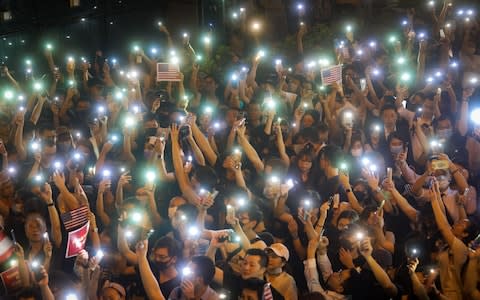Inside the Hong Kong families left broken divided over months of violent protest
The Wongs had always been a close-knit family.
But a brooding disagreement over Hong Kong’s worst political crisis in decades erupted in a bitter argument at a relative’s funeral in August saw father and son angrily throw tea at each other.
Brian, a 37-year-old teacher and the family’s eldest son, was among the shocked onlookers as a table was overturned when the two men could no longer contain their emotions over the city’s fractured politics. “I’ve never seen my father so angry,” he said.
The pro-democracy movement, now entering its fifth month, has taken a heavy toll on Hong Kong families as the middle ground between the city’s polarised political camps narrows, causing personal rifts that may take years to heal.
Brian fears his father and younger brother may never speak to each other again. “Before the movement our family was harmonious and could talk about politics,” he said. “But as the situation has escalated we have become gradually divided.”
In June, his parents, although politically more “blue”, or pro-Beijing, did not oppose the participation of Brian and William, 35, in the more peaceful mass rallies against a controversial bill that would have allowed the extradition of criminal suspects to China.

“At first, they just warned us to be careful,” said Brian. “But [later] my father did not agree with the actions of the more radical protesters, saying they just wanted to become famous by destroying things, including the national emblem and flags,” he added.
William, on the other hand, like many in the so-called “yellow” pro-democracy camp, had been angered by heavy-handed police tactics and violent attacks on protesters, including a shocking mass assault on members of the public at the Yuen Long metro station by triad members in July.
Father and son have not communicated since their heated argument nearly ended in blows. William stopped his weekly visits to the family home and his parents did not call him on his birthday in October.
“My father said that if William doesn’t take the initiative to talk to him, he doesn’t want to see him…My mother is normally the mediator, but even she doesn’t have a solution,” said Brian.
The summer of huge, sometimes violent, pro-democracy protests in the semi-autonomous Chinese city have been cross-generational but are overwhelming led by the young. Academic research has shown that half of those at rallies are between 20 and 30 years old, reported the Hong Kong Free Press.

Ideological splits are becoming more common in families across the city of 7.5 million, where middle-aged parents are more supportive of the government or, fearful of Beijing’s authoritarian leaders, are more accepting of the status quo, while their children take to the streets to push for universal suffrage.
The generational divide is fueled in part by the sources of information different age groups consume.
While younger people glean information from Twitter, Telegram, Whatsapp and other open social media channels, Brian said his parents, both born in China, believed the protests were receiving financial support based on reports on pro-China media or on WeChat, a Chinese messaging app.
A WeChat video of a brutal protesters’ assault on a taxi driver, shared by his mother and her friends, did not reveal that the taxi had driven into a demonstration moments before, seriously injuring a young woman.
Isaac, 20, a psychology student who has been on the protest frontlines since June, said his parents’ fixation on pro-establishment media, which he felt distorted the truth, was a big factor in his decision to leave home.
“The major argument with my family was over watching TV channels…I tried to teach them to use other TV channels and watch different medias..I wanted to expose them to a better news source,” he said.
Their disputes grew as clashes between protesters and the riot police spiraled. “In July, they asked me to obey the law, and constantly urged me not to go out. In August, the police were very brutal, and we had some arguments about the law and the current police brutality,” he said.

Isaac gave up his part-time job to focus on the pro-democracy movement, and became fearful that the police would come looking for him at home.
Meanwhile, his pro-government family criticised the protesters for damaging the public transport system, affecting their commute to work.
“I asked them why they didn’t live in China, if they believed China was all right. We had arguments over money, and my father asked me who will carry the responsibility in this family if he couldn’t get to work. After that they asked me to leave.”
The student initially moved into the notoriously cramped Chungking Mansions hostel before he was offered a room by a stranger, who had been alerted to his plight by the movement’s social media channels.
Isaac said he remained unmoved by the estrangement with his family over politics. “When I left my parent’s home, I felt very cold and lacked emotion,” he said. “My parents are the kind of people who want a safety net and I knew that they cared a lot about “face"."
Some names have been changed

 Yahoo News
Yahoo News 
